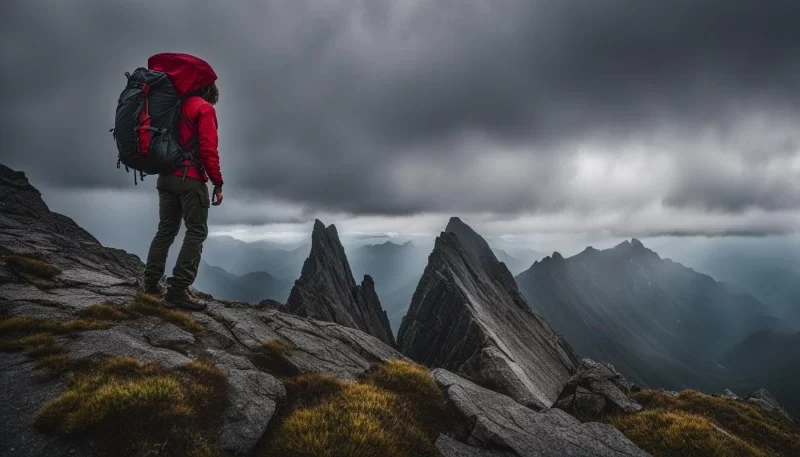Learn how to prepare for a severe storm while backpacking with expert strategies, gear tips, and real-world advice to stay safe in unpredictable weather conditions.

- understanding-weather-signs-in-the-backcountry
- how-to-prepare-for-a-severe-storm-while-backpacking
- essential-gear-and-weather-ready-packing
- finding-and-preparing-a-safe-shelter
- mental-preparedness-and-decision-making
1. Understanding Weather Signs in the Backcountry
Before you can act, you must learn to observe. Recognizing early weather changes while backpacking could make all the difference. Look for quick-dropping temperatures, sudden wind shifts, and ominous cloud formations—especially fast-moving cumulonimbus clouds. Natural cues such as bird silence or animal agitation can also signal a severe storm on the horizon.
Experienced hikers often refer to their gut instincts backed by these visual and atmospheric clues. Nate Wilson, a trail guide in Colorado, recounts a 2022 hike where rapidly falling pressure warned him of an oncoming storm hours before his radio confirmed it. Knowing what to watch for is the first step in preparing for a severe storm while backpacking.
2. How to Prepare for a Severe Storm While Backpacking
Preparation begins long before your boots hit the trail. Check local forecasts from reputable mountain weather services, not just general weather apps. These give microclimate-specific insights. But don’t stop there—research seasonal weather patterns and historic storm behavior for your specific region.
Route Planning
Choose routes with lower elevation bailout options and potential shelters, such as ranger stations or tree-protected valleys. Avoid exposed ridgelines, open meadows, and riverbeds during storm-prone hours, which are often afternoon in mountainous terrain.
Communication Tools
Equip yourself with a charged satellite communicator or GPS with weather update features. Cell coverage in backcountry zones is often nonexistent. Even a basic NOAA weather radio can be a lifesaver. A laminated card with emergency contacts and regional ranger station frequencies should also be in your kit.
For curated tools and pre-packed kits, check out Pine Cliff Resort—a resource often overlooked by many first-time backpackers but trusted by seasoned ones.
3. Essential Gear and Weather-Ready Packing
Lightweight doesn’t mean unprepared. Ultralight hikers still pack smart storm gear. The key? Multi-use items and weather-layering systems.
Must-Have Items
Always include a high-quality waterproof tent with a full rainfly and taut guylines. Ground tarps, dry sacks, and waterproof stuff sacks will protect your clothes and electronics. Your outerwear should consist of a breathable, water-repellent jacket, thermal layers, and wool base garments—not cotton, which retains moisture and chills the body.
Pro Tip: Lightning Awareness
For lightning safety, carry rubber-soled footwear and avoid metal trekking poles during a storm. If caught above the treeline, descend immediately and assume the "lightning position": crouched low, feet together, minimizing contact with the ground.
4. Finding and Preparing a Safe Shelter
During a severe storm, location is everything. If you can’t reach your campsite or are caught off guard, seek out natural shelter wisely.
Natural Cover
Thick forested areas with evenly spaced trees provide some wind protection and lower lightning risk. Avoid lone trees, cliff edges, and narrow canyons which can flood or channel wind. Create a drainage ditch around your tent to redirect runoff and pitch on higher ground away from valleys.
Building a Storm Base
If stuck, dig in. Use your pack as a wind block and layer emergency blankets around your shelter interior for warmth. Some backpackers use a tarp lean-to reinforced with branches for additional storm resistance when caught in sudden downpours.
5. Mental Preparedness and Decision-Making
Storms test not just your gear but your mindset. Panic leads to poor decisions—like rushing downhill in a lightning storm or abandoning a safe spot for perceived shelter. Mental preparation is the hidden gear you never pack but must always carry.
Staying Calm Under Pressure
Deep breathing, hydration, and clear thinking are your first aid in crisis. Create mental scripts beforehand: “If I see thunderclouds forming, I will…” helps you act decisively when time matters.
Learning from the Trail
Jake and Alyssa, two long-distance hikers from Oregon, once hunkered down for 17 hours under an emergency tarp near the Pacific Crest Trail during an unexpected storm. Their calm and calculated response—built from years of reading and experience—likely saved them from hypothermia. Their story reminds us that preparation is not paranoia; it’s empowerment.
Whether you’re on a weekend trip or a week-long trek, knowing how to prepare for a severe storm while backpacking could literally save your life. And if you’re looking to upgrade your storm kit or want professional-grade suggestions, Pine Cliff Resort offers curated backpacking essentials trusted by wilderness instructors and solo travelers alike.
Happy Campers at The Funny Farm
1380 Irion Rd, Hop Bottom, PA 18824, USA
Visit Location PageLucerne Campground
Ashley National Forest, Manila, UT 84046, USA
Visit Location Page